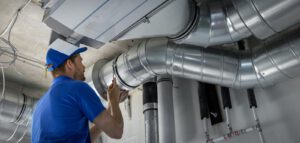Safety Measures for HVAC Workers
Heating, ventilation, and air conditioning systems are interrelated systems that move air around your home or office. They may operate independently, but most often, they work together to keep your building comfortable temperatures. Central HVAC systems circulate air throughout your home using a system of ducts, while other systems move air directly into the room. These components are all very important to the operation of your HVAC system, so make sure that you choose the right one for your home.
HVAC technicians lift and position heavy equipment and work in confined spaces. They may be on roofs or in ducts. They often work in the heat or cold of the day and must be flexible in their work. The job often requires exposure to hazardous weather and electrical currents, but HVAC workers can minimize the risk of injury by following proper safety standards and taking the proper precautions. The following are some of the most important safety measures for HVAC workers. In addition, HVAC technicians must be well-versed in building codes and regulations.
Proper maintenance is essential to keep your HVAC system in top working condition. A dirty coil or a leaking drain pan can result in water leakage. Water can build up in large HVAC systems, causing significant damage. You should also take the necessary steps to prevent water leaks. Check your HVAC system frequently with the help of a digital checklist. Once you have completed these steps, you will have a better idea of what maintenance your system needs.
Moreover, HVAC systems may also include indoor air quality products. These products may be added to the HVAC system to maintain optimal thermal comfort. Additionally, they can help you save energy by regulating the humidity in your home. There are several types of HVAC systems, each suited for a specific home. Your heating and cooling needs will determine what type of system you’ll need. The type of HVAC system you have will depend on the age of your home, the type of air quality, and the age of your property.
During the first few months after installation, you should perform routine cleaning of your HVAC system. However, professional cleaning is recommended every few months. Follow the cleaning instructions provided in the manual for your specific system. To clean the filter yourself, you can begin by wiping down the inside components and vacuuming the outside ones. Always make sure to shut off the electricity before you begin cleaning. You should also read the manual that came with your HVAC system for more detailed information.
A degree in HVAC will help you gain hands-on experience, and an associate’s degree will prepare you for entry-level industry jobs. Some employers prefer licensed HVAC technicians over uncertified individuals. It offers HVAC apprenticeship programs that last three to five years. If you pass the training, employers will usually hire you as a journeyman. There are many other benefits to a college degree. A degree in HVAC is essential for a successful career.
A system can be classified as a central, decentralized, or local HVAC system. The location of the primary equipment determines the type of air or water distribution system needed. The primary components of an HVAC system should be considered during design. The application provides maintenance checklists and equipment inspection reports. The app also integrates smart sensors that measure air quality and display a history of past inspection audits. Whether your HVAC is central, local, or hybrid, you can make a decision based on the information you have collected.
An HVAC system is an integral part of any home or business. It regulates temperature and humidity and ensures that occupants enjoy comfort indoors. It can be installed in large office buildings, residential homes, automobiles, and marine environments. Despite the many benefits, this system can be costly and complicated, so it’s worth understanding the basics. It’s important to understand why HVAC systems are important to the health and comfort of your home or office.
The types of HVAC systems vary, but all have the same basic build concepts. Generally, an HVAC system works to bring fresh air into the home. It does this by extracting outside air and distributing it to the occupied areas. Alternatively, an HVAC system uses outdoor air and reuses it to provide comfort. If you’re not sure whether you need a central or local HVAC system, check out this article. You’ll be glad you did.
